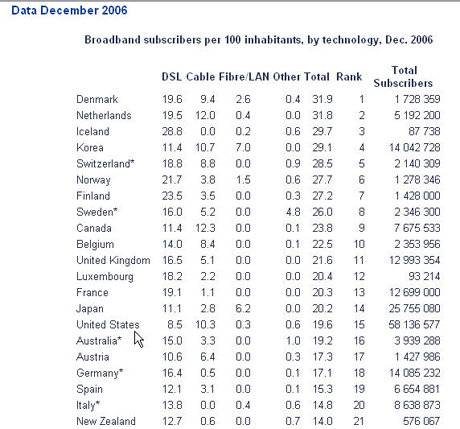U.S. broadband penetration ranking slips yet again; hearings tomorrow


In terms of Internet broadband subscribers per 100 residents, the U.S. keeps slipping further down the world rankings every time a new report is released.
Today is one of those days.
The Organization for Economic Cooperation and Development (OECD) released data that notes that in December, 2006, the U.S. ranks 15th out of the 30 member nations in per capita broadband use. That's down from 12th place six months earlier, and from fourth place in 2001.
In other words, the problem is getting worse.
"We are failing to bring the benefits of broadband to all our citizens, and the consequences will resonate for generations," said Ben Scott, policy of director of Free Press. "There is no justification for America's declining status as a global Internet leader. Instead of more excuses, it's time for true national broadband policy that will put America’s digital future back on track."
I'm going to bet this gets worse before it gets better. That same OECD report ranked the U.S. 20th out of 30 nations in the growth rate of broadband penetration over the past year."
Largely, these sickening trend lines are the consequences of a confluence of monopolistic pricing with little or no governmental oversight.
Due for a release in June, an OECD report entitled “The Communications Outlook 2007," will note that in many of the leading broadband nations, the going broadband access rate is $1 per Mbps- compared to 10 Mbps here.
The OECD isn't accepting this. Neither am I, nor should you.
In fact, there will be a Senate Commerce Committee hearing tomorrow on communications, broadband and competitiveness. Several organizations, including Free Press, Consumers Union and the Consumer Federation of America will urge Congress to consider recommending a national broadband policy that, in the words of a press release authored by Free Press' Craig Aaron, "that enhances competition, protects free speech, expands opportunities to bring new providers into the marketplace, and uses economic incentives to stimulate investment in underserved areas."
To that, I add that I believe economy where consumers are still communicating via dial-up is at a significant competitive disadvantage.